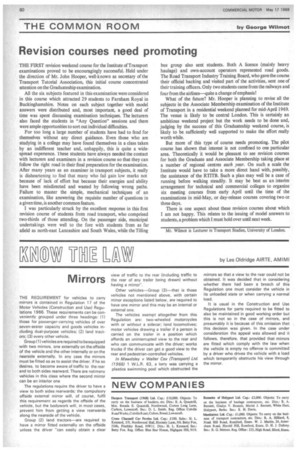Revision courses need promoting
Page 82

If you've noticed an error in this article please click here to report it so we can fix it.
THE FIRST revision weekend course for the Institute of Transport examinations proved to be encouragingly successful, Held under the direction of Mr. John Hooper, well-known as secretary of the Transport Tutorial Association, this initial course concentrated attention on the Graduateship examination.
All the six subjects featured in this examination were considered in this course which attracted 29 students to Farnham Royal in Buckinghamshire. Notes on each subject together with model answers were distributed and, most important, a good deal of time was spent discussing examination techniques. The lecturers also faced the students in "Any Question" sessions and there were ample opportunities to sort out individual difficulties.
For too long a large number of students have had to fend for themselves without any direct guidance. Even those who are studying in a college may have found themselves in a class taken by an indifferent teacher and, unhappily, this is quite a widespread experience. These students have always needed the contact with lecturers and examiners in a revision course so that they can follow the right road in their final preparation for the examination. After many years as an examiner in transport subjects, it really is disheartening to find that many who fail gain low marks not because of lack of effort but because their energies and ability have been misdirected and wasted by following wrong paths. Failure to master the simple, mechanical techniques of an examination, like answering the requisite number of questions in a given time, is another common feature.
I was particularly struck by the excellent response in this first revision course of students from road transport, who comprised two-thirds of those attending. On the passenger side, municipal undertakings were well to the fore with students from as far afield as north-east Lancashire and South Wales, while the Tilling bus group also sent students. Both A licence (mainly heavy haulage) and own-account operators represented road goods. The Road Transport Industry Training Board, who gave the course their official backing and visited part of the activities, sent one of their training officers. Only two students came from the railways and four from the airlines—quite a change of emphasis!
What of the future? Mr. Hooper is planning to revise all the subjects in the Associate Membership examination of the Institute of Transport in a residential weekend planned for mid-April 1969. The venue is likely to be central London. This is certainly an ambitious weekend project but the work needs to be done and, judging by the success of this Graduateship weekend course, is likely to be sufficiently well supported to make the effort really worth while.
But more of this type of course needs promoting. The pilot course has shown that interest is not confined to one particular area. Theoretically it would be pleasant to see revision courses for both the Graduate and Associate Membership taking place at a number of regional centres each year. On such a scale the Institute would have to take a more direct hand with, possibly, the assistance of the RTTIB. Such a plan may well be a case of running before walking steadily. It may be best as an interim arrangement for technical and commercial colleges to organize six meeting courses from early April until the time of the examinations in mid-May, or day-release courses covering two or three days.
There is one aspect about these revision courses about which I am not happy. This relates to the issuing of model answers to students, a problem which I must hold over until next week.
Mr. Wilmot is Lecturer in Transport Studies, University of London.




























































































































